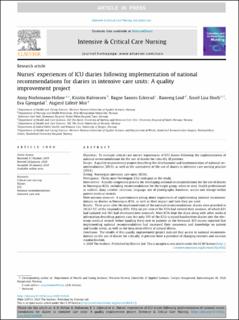Nurses’ experiences of ICU diaries following implementation of national recommendations for diaries in intensive care units: A quality improvement project
Holme, Anny Norlemann; Halvorsen, Kristin; Eskerud, Ragne Sannes; Lind, Ranveig; Storli, Sissel Lisa; Gjengedal, Eva; Moi, Asgjerd Litleré
Journal article, Peer reviewed
Published version

Åpne
Permanent lenke
https://hdl.handle.net/11250/2732631Utgivelsesdato
2020Metadata
Vis full innførselSamlinger
Originalversjon
Intensive and Critical Care Nursing. 2020, 59, 102828. https://doi.org/10.1016/j.iccn.2020.102828Sammendrag
Objectives
To evaluate critical care nurses’ experiences of ICU diaries following the implementation of national recommendations for the use of diaries for critically ill patients.
Design
A quality improvement project describing the development and implementation of national recommendations (2011), as well as the assessment of the use of diaries in intensive care nursing practice (2014).
Setting
Norwegian intensive care units (ICUs).
Participants
Thirty-nine Norwegian ICUs took part in the study.
Intervention
A multi-component process for developing national recommendations for the use of diaries in Norwegian ICUs, including recommendations for the target group, when to start, health professionals as authors, diary content, structure, language, use of photographs, handover, access and storage within patient medical records.
Main outcome measure
A questionnaire asking about experiences of implementing national recommendations on diaries in Norwegian ICUs, as well as their impact and how they are used.
Results
Three years after the implementation of the national recommendations, diaries were provided in 24 (61.5%) of the responding ICUs. Fifty-six per cent of the ICUs had revised their routines, of which 62% had updated and 38% had developed new protocols. Most ICUs kept the diary along with other medical information describing patient care, but only 50% of the ICUs scanned handwritten diaries into the electronic medical records before handing them over to patients or the bereaved. ICU nurses reported that implementing national recommendations had increased their awareness and knowledge on patient and family needs, as well as the long-term effects of critical illness.
Conclusion
The results of this quality improvement project indicate that access to national recommendations on the use of diaries for critically ill patients have a potential of changing routines and increase standardisation.
